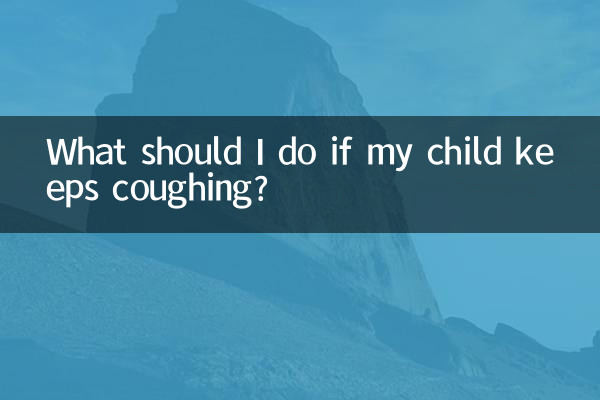What should I do if my child keeps coughing? ——10-day network hotspot analysis and response guide
Recently, the problem of children's cough has become the focus of parents' attention. Based on the hot topic data on the Internet in the past 10 days, we have compiled relevant hot topics and scientific response methods to help parents better deal with their children's cough problems.
1. Statistics of hot topics about children’s cough across the Internet (last 10 days)

| Ranking | Topic keywords | Discussion popularity | main focus |
|---|---|---|---|
| 1 | child coughing at night | 85,600+ | Affects sleep and lasts for a long time |
| 2 | Cough medicine options | 72,300+ | Chinese medicine vs Western medicine, side effects |
| 3 | allergic cough | 63,400+ | Allergen screening and preventive measures |
| 4 | Diet therapy | 58,900+ | Traditional methods such as pear water and honey |
| 5 | cough duration | 45,200+ | When to seek medical treatment and recovery period |
2. Analysis of common causes of cough in children
According to recent interviews with pediatric experts and data released by medical institutions, the main causes of persistent cough in children include:
| Reason type | Proportion | Typical symptoms | duration |
|---|---|---|---|
| upper respiratory tract infection | 42% | accompanied by runny nose and low fever | 1-2 weeks |
| allergic cough | 28% | No phlegm, worsening at night | more than 4 weeks |
| bronchitis | 15% | Excessive phlegm and rough breath sounds | 2-3 weeks |
| other reasons | 15% | Professional diagnosis required | indefinite |
3. 5 questions parents are most concerned about and answers from experts
1.Does my child need medical attention if he or she has a cough for more than a week?
Experts suggest: If a cough is accompanied by high fever, difficulty breathing or listlessness, you should seek medical treatment immediately; if a cough alone has no other symptoms, you can observe it for 2 weeks.
2.Do cough medicines really work?
The latest research shows that children under 6 years old are not recommended to use cough suppressants as they may inhibit sputum production; honey (over 1 year old) may be more effective than cough syrup.
3.What should I do if my cough gets worse at night?
Practical suggestions: Elevate the head of the bed by 15 degrees, keep the bedroom humidity at 50%-60%, and rinse your mouth with warm water before going to bed.
4.How to diagnose allergic cough?
Diagnostic criteria: Frequent attacks in specific environments, no symptoms of infection, positive allergen test, and effective anti-allergic treatment.
5.Are dietary therapy methods trustworthy?
Scientific verification: Pear water can relieve throat discomfort, but has no therapeutic effect; those over 1 year old can try 1/2-1 teaspoon of honey (note the risk of suffocation).
4. Home care guide for children with cough
| Nursing measures | Applicable age | Operational points | Things to note |
|---|---|---|---|
| increase air humidity | All ages | Use a humidifier (change water daily) | Avoid excessive moisture |
| Drink more warm water | More than 6 months | A small amount of times | avoid ice water |
| Patting on the back to expel phlegm | 1 year old and above | Shoot from bottom to top with hollow palms | Avoid within 1 hour after meals |
| honey for cough | 1 year old and above | 1/2-1 teaspoon before bed | Strictly prohibited for use under 1 year old |
5. Warning Signs When You Need to Seek Medical Care
According to recent emergency data from tertiary hospitals, you should seek medical attention immediately if you encounter the following situations:
| red flag | possible causes | Urgency |
|---|---|---|
| Respiratory rate>40 times/min | pneumonia/asthma | seek medical attention immediately |
| purple lips | hypoxia | Emergency |
| Cough with barking sound | acute laryngitis | See a doctor within 2 hours |
| High fever that lasts >3 days | severe infection | See a doctor within 24 hours |
6. Expert advice on preventing coughs in children
1. Get influenza vaccine (applicable to those over 6 months old)
2. Children with allergies should do a good job in environmental control (dust mite removal, mildew prevention)
3. Avoid exposure to second-hand and third-hand smoke
4. Strengthen hand washing hygiene (especially after returning home from school)
5. Maintain a regular schedule and enhance immunity
Recent data shows that preventive measures can reduce the incidence of repeated coughing in children by 30%-50%. If the cough persists for more than 4 weeks, it is recommended to go to a pediatric respiratory specialist for detailed examination.

check the details

check the details